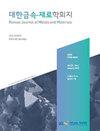镍基填料对GTAW焊接超奥氏体不锈钢(UNS S31254)热影响区耐蚀性的影响
IF 1.4
4区 材料科学
Q4 MATERIALS SCIENCE, MULTIDISCIPLINARY
引用次数: 0
摘要
研究了镍基填料对焊接超奥氏体不锈钢(SASS)耐腐蚀性能的影响。在钨极气体保护焊SASS中使用镍基填料会在其焊接未混合区形成细小的Cr-Mo富集相,这使其更容易受到局部腐蚀。金相观察表明,凹坑是在未混合区析出的Cr-Mo富集相周围萌生的,并沿基体金属扩展。使用三种类型的镍基填料(铬镍铁合金625、铬镍铁合金622、哈氏合金276)的焊接样品的腐蚀损伤程度随着所用填料中Mo含量的增加而增加。填料中Mo含量越高,在未混合区沉淀的Mo浓度越高的Cr-Mo富集相的尺寸/数量比就越高。基于这些结果,提出镍基高合金钢填料中的Mo含量会对未混合区Cr-Mo富集相的析出行为产生很大影响,导致SASS焊缝的耐蚀性下降。因此,填料中的Mo含量应优化为与基底金属的含量相似,以免受到局部腐蚀的影响。本文章由计算机程序翻译,如有差异,请以英文原文为准。
Effect of Ni-based Fillers on Corrosion Resistance of Heat Affected Zone of Super Austenitic Stainless Steel (UNS S31254) Welded by GTAW
The effect of Ni-based fillers on corrosion resistance of welded super austenitic stainless steel (SASS) was examined. The use of Ni-based fillers for gas tungsten arc welded SASS leads to the formation of fine Cr-Mo enriched phase in its weld unmixed zone, which makes it more susceptible to the localized corrosion. The metallographic observations showed that the pits were initiated around the fine Cr-Mo enriched phase precipitated in unmixed zone, and they were propagated along the base metal. The degree of corrosion damage among the welded samples using the three types of Ni-based fillers (Inconel 625, Inconel 622, Hastelloy 276) increased with the Mo contents in the fillers applied. The higher the Mo contents in the fillers, the higher the size/number ratio of Cr-Mo enriched phase with higher concentration of Mo, precipitated in unmixed zone. Based on the results, it is proposed that the Mo contents in Ni-based high alloyed fillers can have a great effect on the precipitation behavior of Cr-Mo enriched phase in unmixed zone, causing deterioration of corrosion resistance of SASS welds. Therefore, the Mo content in the filler should be optimized with the content similar to that of the base metal so as not to susceptible to localized corrosion.
求助全文
通过发布文献求助,成功后即可免费获取论文全文。
去求助
来源期刊

Korean Journal of Metals and Materials
MATERIALS SCIENCE, MULTIDISCIPLINARY-METALLURGY & METALLURGICAL ENGINEERING
CiteScore
1.80
自引率
58.30%
发文量
100
审稿时长
4-8 weeks
期刊介绍:
The Korean Journal of Metals and Materials is a representative Korean-language journal of the Korean Institute of Metals and Materials (KIM); it publishes domestic and foreign academic papers related to metals and materials, in abroad range of fields from metals and materials to nano-materials, biomaterials, functional materials, energy materials, and new materials, and its official ISO designation is Korean J. Met. Mater.
 求助内容:
求助内容: 应助结果提醒方式:
应助结果提醒方式:


